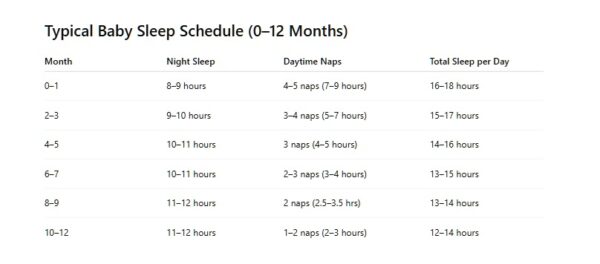12-Month Sleep Regression: Causes, Symptoms, and Solutions
Parents often breathe a sigh of relief as their little one approaches their first birthday. However, for many, this milestone comes with an unexpected challenge: the 12-month sleep regression. Suddenly, the baby who was sleeping through the night is waking frequently, resisting naps, and generally disrupting household peace. This can be a confusing and exhausting time for parents, but understanding the phenomenon can empower you to navigate it more effectively.

What is 12-Month Sleep Regression?
![]()
The term “12-month sleep regression” refers to a period when a 1-year-old’s previously reliable sleep patterns become disrupted. While not all babies experience it, it’s common enough to be considered a normal developmental phase. This regression can be particularly challenging because it coincides with significant milestones such as increased mobility, language development, and separation anxiety.
Common Sleep Regression Ages
This change in sleep patterns often occurs at certain ages, commonly around 4 months, 8 to 10 months, 12 months, 18 months, and 2 years. During these times, children are going through significant developmental milestones, such as learning to roll over, crawl, walk, or talk, which can disrupt their sleep. While these regressions can be challenging for both the child and their parents, they are typically temporary and part of normal growth.
Maintaining healthy sleep habits can really help when dealing with a sleep regression. By sticking to a consistent bedtime routine, making sure the sleep environment is calm and comfortable, and encouraging relaxation before bed, you can ease the effects of these challenging periods. Good sleep habits help your body and mind adjust more easily, reducing how long the sleep regression lasts and making it less disruptive. Essentially, when you keep up with good sleep practices, it becomes easier to handle the changes that come with a sleep regression, helping you and your loved ones get back to restful nights sooner.
Understanding toddler sleep patterns and shifts can be quite a journey for parents. Toddlers often experience changes in their sleep routines as they grow, which can sometimes be confusing or challenging to manage. Typically, a toddler needs about 11 to 14 hours of sleep in a 24-hour period, including naps. However, as they develop, their sleep needs and patterns can shift, with some transitioning from two naps to one around 18 months.
Additionally, toddlers might experience sleep disruptions due to teething, developmental milestones, or changes in their environment or routine. It’s important for parents to remain patient and consistent with bedtime routines, creating a calming environment that helps their little ones settle down for the night. Understanding these shifts and being adaptable can help ensure that both toddlers and parents get the rest they need.
What is a Nap Transition?
A nap transition refers to the period when a baby or young child adjusts from needing multiple naps throughout the day to fewer naps, or eventually to just one nap. This transition is a normal part of development and happens as the child grows and their sleep needs change. During a nap transition, it might seem like the child’s sleep schedule is a bit unpredictable, with some days requiring more rest and others less. Parents often notice signs like the child resisting naps, having trouble falling asleep, or waking up earlier than usual. It’s important to be patient and flexible during this time, gradually adjusting nap times and routines to support the child’s changing needs.

Signs of 12-Month Sleep Regression
![]()
Identifying sleep regression can sometimes be tricky, but there are some common signs to watch for:
- Increased night waking
- Difficulty falling asleep at bedtime
- Shorter naps or outright nap refusal
- More fussiness or clinginess during the day and night
- Changes in appetite
These symptoms can be frustrating, but they are often temporary and a normal part of your child’s development.

Why Does 12-Month Sleep Regression Happen?
![]()
Several factors contribute to this sleep disruption:
- Developmental Milestones: At around 12 months, babies are learning to walk, talk, and explore the world in new ways. This cognitive and physical growth can be mentally stimulating, making it harder for them to wind down.
- Separation Anxiety: One-year-olds are becoming more aware of their surroundings and may experience anxiety when separated from their parents, leading to sleep disturbances.
- Teething: Many babies are also getting new teeth at this age, which can cause discomfort and night waking.
- Changes in Sleep Needs: Around the one-year mark, babies may need less sleep than they did as younger infants, so they may resist sleep if they’re not tired.
12-Month Sleep Regression Tips
![]()
While this phase can be trying, there are strategies you can use to ease the process:
- Establish a Routine: Consistent nap times, bedtime, and rituals can provide a sense of security and predictability for your child.
- Adjust Schedules: If your baby is not tired at their usual nap time, consider adjusting nap schedules to better align with their needs.
- Encourage Self-Soothing: If your baby has been able to self-soothe in the past, encourage this skill by giving them time to settle down before rushing in.
- Provide Comfort: Offer extra cuddles and reassurance if your baby seems anxious or upset.
- Address Teething Pain: If teething is a factor, use appropriate teething rings or consult your pediatrician for pain relief options.
Patience is key during this phase. It’s important to remember that this regression is temporary and your child will eventually return to better sleep habits.

12-Month Sleep Regression Solutions
![]()
When it comes to finding solutions for the 12-month sleep regression, consider these approaches:
- Adapt Bedtime: If your baby isn’t tired at their usual bedtime, try pushing it back slightly. A slightly later bedtime can lead to less resistance and a quicker transition to sleep.
- Daytime Activity: Ensure your baby has plenty of opportunities for physical activity during the day. This can help them burn off energy and be more ready for sleep.
- Limit Screen Time: Screen time can be overstimulating for babies, especially before bed. Try to keep screens off for at least an hour before bedtime to help your baby wind down.
- Monitor Sleep Environment: A dark, quiet, and cool environment can help promote better sleep. Consider using blackout curtains and white noise machines if necessary.
- Stay Consistent: Consistency with your response to night waking can help. Decide on a plan with your partner for how you’ll handle wake-ups and stick to it.
As babies grow, their sleep patterns change. While most little ones aren’t quite ready to give up any of their daily naps at this age, they may be ready to stay awake a bit longer between naps. This is known as lengthening their wake windows. By gradually increasing the time they spend awake, babies can start adjusting to their natural sleep needs. This can help them settle into a more consistent routine and might even make for a more restful sleep when they do nap. Just remember to watch for signs of tiredness, so you can find the right balance for your baby.
Always remember that every baby is different. What works for one may not work for another, so be willing to try different strategies to find what works best for your family.
How Long Does 12 Month Sleep Regression Last?
The good news is that this phase doesn’t last forever. Typically, it can last anywhere from a few weeks to a month. During this time, it’s important for parents to try to maintain a consistent bedtime routine and be patient as their little one adjusts. Eventually, most babies settle back into a more regular sleep pattern.
Consider Sleep Training for Sleep Issues
Sleep training is a process used to help babies and young children learn how to fall asleep on their own and stay asleep through the night. It often involves establishing a consistent bedtime routine and gradually adjusting how parents respond to their child’s nighttime awakenings. The goal is to encourage the child to develop the ability to self-soothe and return to sleep without needing help from a parent.
There are different methods of sleep training, ranging from letting the child cry for a short period before comforting them to more gentle approaches that involve staying in the room until the child falls asleep. Sleep training can be beneficial for both the child and the parents, as it can lead to better sleep for everyone involved.

How this changes each month 0–3 months: baby sleeps a lot, but in short stretches—day and night mixed. Many naps, unpredictable schedule. 4–6 months: starts sleeping longer at night. Daytime naps become fewer but more regular. 7–9 months: most sleep is at night. 2 solid naps during the day. 10–12 months: night sleep gets longer (up to 12 hours). 1 or 2 daytime naps (often just after lunch and maybe late morning).
Professional Advice and When to Seek Help
![]()
If you’re struggling with the 12 month sleep regression, don’t hesitate to reach out to your pediatrician or a certified pediatric sleep consultant. They can offer personalized advice and ensure there are no underlying health issues contributing to sleep problems.
Consider seeking professional help if:
- Your baby’s sleep regression lasts longer than a few weeks.
- Your baby is showing signs of extreme distress or significant changes in behavior.
- You’re concerned about your baby’s development in other areas.
Getting professional advice can provide reassurance and possibly identify any issues that need to be addressed.
Case Studies and Success Stories
![]()
Many parents find comfort in hearing about others who have navigated the 12-month sleep regression successfully. For instance, one family might share that adjusting their baby’s nap schedule was the key, while another might have found that a consistent bedtime routine made all the difference. These stories can offer hope and real-world tips for parents in the midst of sleep regression.
Moreover, research has shown that establishing a bedtime routine is associated with improved sleep outcomes for children. A study published in the journal Sleep found that routines are beneficial in promoting better sleep patterns and reducing night wakings.
![]()
In conclusion, the 12-month sleep regression is a temporary but challenging phase that many families face. By understanding the causes, recognizing the signs, and implementing practical tips and solutions, you can help your baby (and yourself) get through this period. Remember to maintain a consistent routine, adjust schedules as needed, and seek professional advice if necessary. With patience and perseverance, you and your baby will soon return to peaceful nights.
Embrace this time as a part of your child’s growth, and know that with each challenge comes the opportunity for learning and bonding. The 12-month sleep regression isn’t easy, but with the right approach, it can be managed, and you’ll come out on the other side with new insights into your child’s development and needs.

